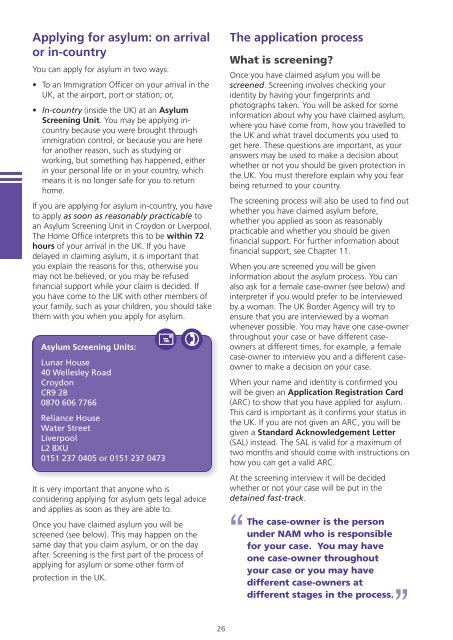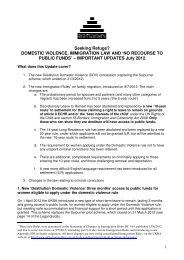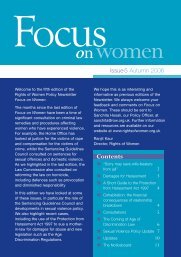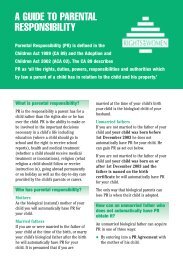Seeking Refuge? - Rights of Women
Seeking Refuge? - Rights of Women
Seeking Refuge? - Rights of Women
Create successful ePaper yourself
Turn your PDF publications into a flip-book with our unique Google optimized e-Paper software.
Applying for asylum: on arrival<br />
or in-country<br />
You can apply for asylum in two ways:<br />
• To an Immigration Officer on your arrival in the<br />
UK, at the airport, port or station; or,<br />
• In-country (inside the UK) at an Asylum<br />
Screening Unit. You may be applying incountry<br />
because you were brought through<br />
immigration control, or because you are here<br />
for another reason, such as studying or<br />
working, but something has happened, either<br />
in your personal life or in your country, which<br />
means it is no longer safe for you to return<br />
home.<br />
If you are applying for asylum in-country, you have<br />
to apply as soon as reasonably practicable to<br />
an Asylum Screening Unit in Croydon or Liverpool.<br />
The Home Office interprets this to be within 72<br />
hours <strong>of</strong> your arrival in the UK. If you have<br />
delayed in claiming asylum, it is important that<br />
you explain the reasons for this, otherwise you<br />
may not be believed, or you may be refused<br />
financial support while your claim is decided. If<br />
you have come to the UK with other members <strong>of</strong><br />
your family, such as your children, you should take<br />
them with you when you apply for asylum.<br />
Asylum Screening Units:<br />
Lunar House<br />
40 Wellesley Road<br />
Croydon<br />
CR9 2B<br />
0870 606 7766<br />
Reliance House<br />
Water Street<br />
Liverpool<br />
L2 8XU<br />
0151 237 0405 or 0151 237 0473<br />
+ )<br />
It is very important that anyone who is<br />
considering applying for asylum gets legal advice<br />
and applies as soon as they are able to.<br />
Once you have claimed asylum you will be<br />
screened (see below). This may happen on the<br />
same day that you claim asylum, or on the day<br />
after. Screening is the first part <strong>of</strong> the process <strong>of</strong><br />
applying for asylum or some other form <strong>of</strong><br />
protection in the UK.<br />
The application process<br />
What is screening?<br />
Once you have claimed asylum you will be<br />
screened. Screening involves checking your<br />
identity by having your fingerprints and<br />
photographs taken. You will be asked for some<br />
information about why you have claimed asylum,<br />
where you have come from, how you travelled to<br />
the UK and what travel documents you used to<br />
get here. These questions are important, as your<br />
answers may be used to make a decision about<br />
whether or not you should be given protection in<br />
the UK. You must therefore explain why you fear<br />
being returned to your country.<br />
The screening process will also be used to find out<br />
whether you have claimed asylum before,<br />
whether you applied as soon as reasonably<br />
practicable and whether you should be given<br />
financial support. For further information about<br />
financial support, see Chapter 11.<br />
When you are screened you will be given<br />
information about the asylum process. You can<br />
also ask for a female case-owner (see below) and<br />
interpreter if you would prefer to be interviewed<br />
by a woman. The UK Border Agency will try to<br />
ensure that you are interviewed by a woman<br />
whenever possible. You may have one case-owner<br />
throughout your case or have different caseowners<br />
at different times, for example, a female<br />
case-owner to interview you and a different caseowner<br />
to make a decision on your case.<br />
When your name and identity is confirmed you<br />
will be given an Application Registration Card<br />
(ARC) to show that you have applied for asylum.<br />
This card is important as it confirms your status in<br />
the UK. If you are not given an ARC, you will be<br />
given a Standard Acknowledgement Letter<br />
(SAL) instead. The SAL is valid for a maximum <strong>of</strong><br />
two months and should come with instructions on<br />
how you can get a valid ARC.<br />
At the screening interview it will be decided<br />
whether or not your case will be put in the<br />
detained fast-track.<br />
“<br />
The case-owner is the person<br />
under NAM who is responsible<br />
for your case. You may have<br />
one case-owner throughout<br />
your case or you may have<br />
different case-owners at<br />
different stages in the process.<br />
”<br />
26
















